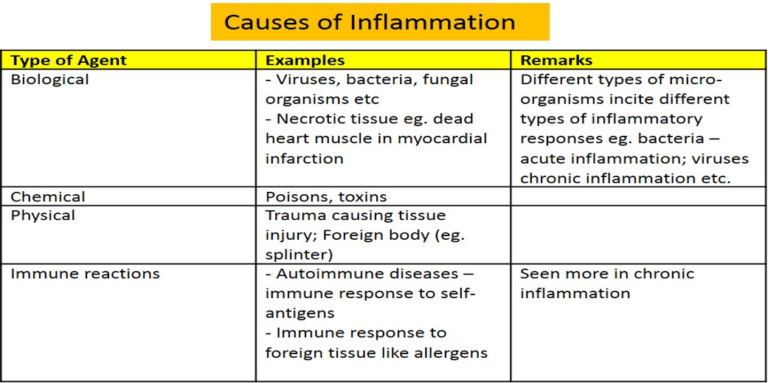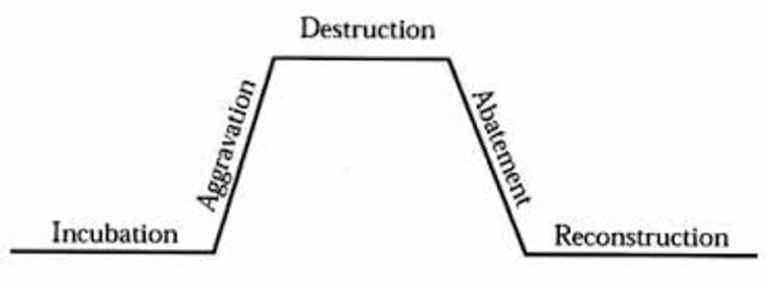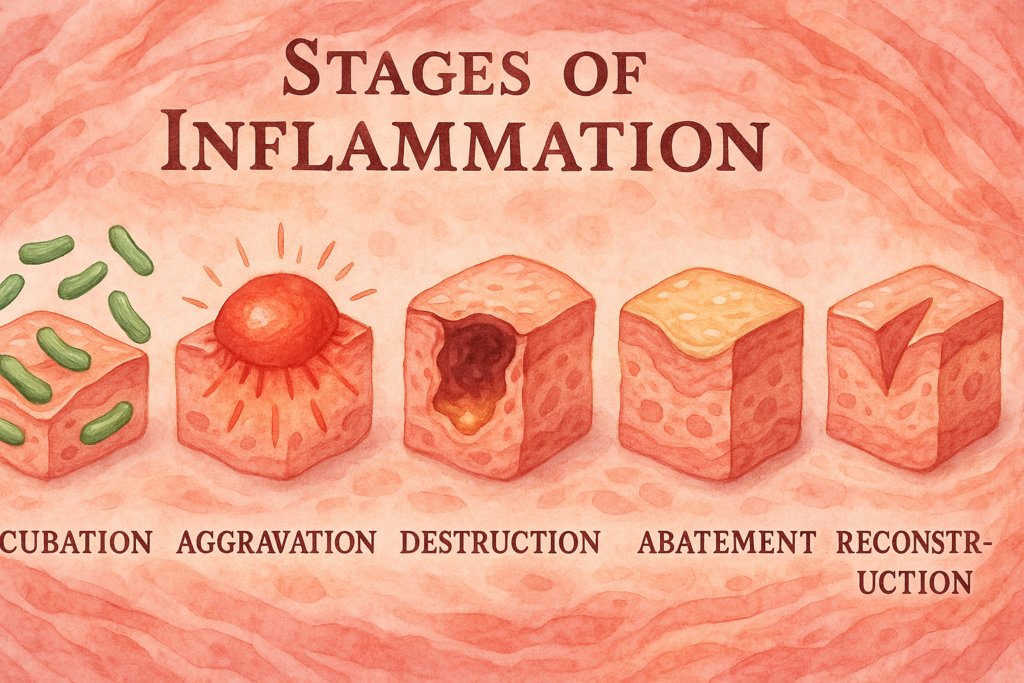- Inflammation is a part of the body’s defense mechanism. It is the process by which the immune system recognizes and removes harmful and foreign stimuli and begins the healing process.
- Inflammation is an acute symptom, i.e. after injury, it is the part of the body’s positive response to aid the healing process.
Agents that cause inflammation

Cardinal Signs of Inflammation
Based on visual observation, the ancients characterized inflammation by five cardinal signs, namely,
- Redness (rubor),
- Swelling (tumor),
- Heat (calor)
- Pain (dolor)
The above signs were described by Celsus in 30 B.C
Later, Virchow in 1902 added
- Loss of function (functio laesa)
Stages of Inflammation
- Incubation
- Aggravation
- Destruction
- Abatement and
- Reconstruction

1. Incubation:
- It is the time between the exposure to an infectious disease and its development.
- It is the time duration between exposure to the pathogens and the appearance of the symptoms of the disease.
- This period may last from a few minutes to a few days, weeks, months or even years.
2. Aggravation:
- During this period there is battle between the phagocytes and natures antitoxins with the poisons and microorganism of disease.
- This gradually progresses and is accompanied by fever and inflammation, increase in temperature.
- It progresses until it reaches its climax, marked by the greatest intensity of feverish symptoms.
3. Destruction:
- This battle between the forces of disease and the healing forces is accompanied by the disintegration of tissues due to the accumulation of exudates, to pus formation, the development of abscesses, boils, fistulas, open sores, etc. and to other morbid changes.
- It involves the destruction of phagocytes, bacteria, blood vessels and tissues.
- The stage of destruction ends in crisis, which may be either fatal or beneficial.
- If the healing forces of the organism are in the ascendancy and if they are supported by the right treatment which tends to built up the blood, increase the vitality and promotes elimination, then the poisons and the microorganism of disease will gradually be overcome, absorbed or eliminated and by degrees, the tissues will be cleared of the debris of the battle field.
4. Abatement:
- The absorption and elimination of exudates, pus etc. takes place during the period of abatement.
- If the healing forces of nature are in ascending and if they are supported by the right treatment which tends to built up the blood increase the vitality and promote elimination.
- Then, the poisons and microorganism gradually overcome and eliminated and this is accompanied by gradual lowering of temperature, pulse rate and other symptoms of fever and inflammation.
- So that the affected area will be cleared off.
5. Reconstruction:
- When the period of abatement has run its course and the affected areas have been cleared of the morbid accumulations and obstructions, then, during the fifth stage of inflammation, the work of rebuilding the injured parts and organs begins.
Suppression during the first two stages of Inflammation:
- It may be suggested that suppression during the stages of incubation and aggravation need not have fatal consequences if followed by natural living and eliminative treatment.
- Such procedure always involves the danger of concentrating the disease poisons in vital parts and organs, thus laying the foundation for chronic destructive diseases.
- Furthermore, it is not at all necessary to suppress inflammatory processes by poisonous drugs and other unnatural means, because we can easily and surely control them and keep them from becoming dangerous by our natural means of treatment.
Suppression during the third stage of Inflammation:
- Should the inflammatory processes be suppressed during the stage of destruction, the result would be still more serious and far reaching.
- We have learned that during this stage the affected parts and organs are involved in more or less disintegration.
- They are filled with morbid exudates, pus etc which interfere with and make impossible normal nutrition and functioning.
- If suppression takes place during this stage, it is obvious that the affected areas will be left permanently in a condition of destruction.
Suppression during the fourth and fifth stage of Inflammation:
- Let us see what happens when acute diseases are suppressed during the stages of abatement and reconstruction.
- If the defenders of the body, the phagocytes and antitoxins, produced in the tissues and organs, gain the victory over inimicial forces which are threatening the health and life of the organism, then the symptoms of inflammation, swelling, redness, heat, pain and the accelerated heart action which accompanies them gradually subsides.
- The debris of the battlefield is carried away through the venous circulation which forms the drainage system of the body.
- If suppressed, leads to chronic conditions.

